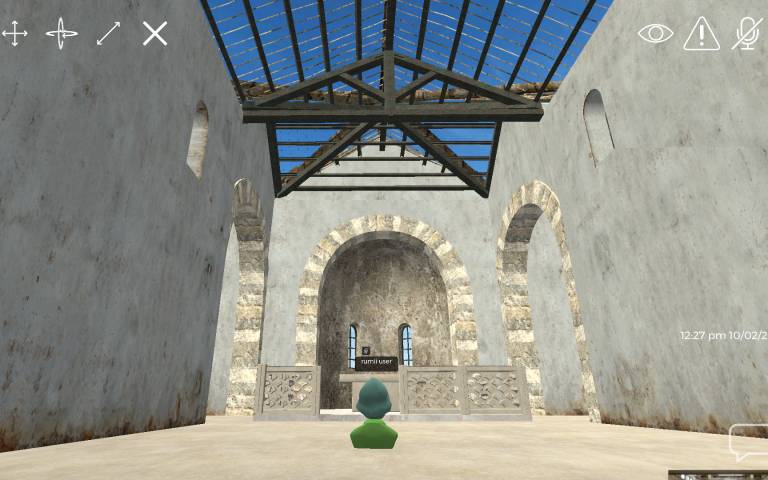Adapting global engagement: Using virtual reality for language teaching
Professor Andrea Révész (IOE) is collaborating with partners in Italy and the USA to resurrect historic locations as virtual models to help students learn English.

20 November 2020
Professor Révész has been working closely with the University of Salento’s Augmented and Virtual Reality (AVR) Lab industry partners to create student-centred tasks that are relevant to real-life situations where English is used outside the classroom.
For the project, supported by the Global Engagement Funds, she collaborated with University of Salento colleagues Professor Lucio Tommaso De Paolis, PhD students Carolina Gatto and Doriana Cisternino, and Michael McDonald, a TEFL-qualified English teacher and founder of the Gold Lotus consultancy in Italy.
The team has been using Task-Based Language Teaching (TBLT) methodology, which aims to promote language learning through engaging learners in authentic situations.
Virtual reality offers considerable potential for implementing TBLT by immersing students in 360-degree contexts that resemble the real world, like restaurants, train stations, doctors’ surgeries, and tourist attractions.
Together they successfully reconfigured a 3D model of a 1,500-year-old church from southern Italy as a tool to help teach and learn English.
Resurrecting history
The ancient church – located in Vaste, Puglia – was re-created in VR form by Giovanni Mastronuzzi from the University of Salento’s Department of Cultural Heritage so that it could be placed onto the rumii VR collaboration platform, developed in the USA.
Users take on an avatar to visit the church in virtual reality. They can see and speak to other people in the same virtual space in real time, from anywhere in the world.
They recently launched the ‘VR for English and Future Skills’ project at a secondary school in Bari, southern Italy.
Professor Révész said: “This project is helping students to improve their English language skills using virtual reality, in addition to their skills for the future. This covers areas such as presentations, public speaking and other activities harnessing the power of VR in order to best prepare them for their futures in a globalised, dynamic working world.
“This initiative has opened up new possibilities for communities to not only resurrect lost pieces of history, but to use those historical locations as a source for learning languages.”
Adapting the project to COVID
Professor Révész was due to travel to Italy in early June 2020 to meet fellow collaborators and attend the local secondary school to meet the students who would be participating in the research. Her collaborators were then due to return the visit in October 2020 to present the technology, research and findings to students at UCL.
With travel impossible due to the pandemic, and thanks to the VR element already in place, the team were able to develop and then deliver the planned sessions over Zoom instead.
They made changes to the way in which the research was conducted locally in Italy. They reduced the number of students involved in the weekly sessions and adhered to strict hygiene standards, particularly when using and sharing hardware like VR headsets.
Adapting the approach meant there is ample physical distance among members of the group and that no student has to share a VR headset with anyone else. Each headset is also thoroughly cleaned after with medical-grade products.
The secondary school also purchased silicone face covers for each student to use over the foam covers of the VR headsets, to further minimise risks. Parents of the participating students are kept informed of all measures being taken.
“Interestingly, given the global pandemic, Zoom has played an even greater role in the advancement of the project that we initially thought,” added Professor Révész.
Further information
For the latest news about UCL’s international activity, partnerships and opportunities, subscribe to our bimonthly Global Update newsletter.
 Close
Close

